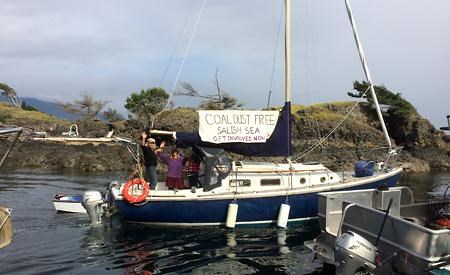In response to the announcement of the approval of permits for the shipment of US thermal coal through Greater Vancouver, the Fraser River, and up the Salish Sea to Texada Island, residents in the region protested by occupying the Sabine Channel on Saturday, October 4.
More than 150 people, primarily from Lasqueti Island’s 426 population, came out in 45 boats and around 60 joined them on the shoreline to object to the Salish Sea being the staging ground for the export of thermal coal from Wyoming and Montana to Asia. Several boats from Texada and Thetis islands joined the occupation.
US ports have said no to the transportation of thermal coal. The State of Oregon denied a proposed export facility and two proposals for the State of Washington are undergoing extensive public and environmental reviews amid strong elected official and citizen opposition.
In an effort to ship the coal from North America to Asia, Port Metro Vancouver has granted a permit to Fraser Surrey Docks to receive four million tonnes of coal annually. The coal will arrive at the dock by two trains per day up to a kilometre in length. The coal will be transferred onto two open-topped barges per day to be transported down the Fraser River. They will then head north to traverse the Salish Sea and use the narrow Sabine Channel between Lasqueti and Texada to reach the staging grounds at Lafarge Canada Inc.’s Texada Quarry site on Texada’s west coast.
At the quarry, it is proposed the coal will be offloaded by conveyor, staged, then reloaded onto deep-sea freighters and transported past Parksville, Qualicum Beach and the Gulf Islands to the Pacific and their final destination in Asia.
“We are deeply concerned that the shipping and handling of so much thermal coal will release coal dust into the air and the marine environment”, said Andrew Fall, from Coal Dust Free Salish Sea. “Yet the province of BC did not require an Environmental Impact Assessment, and neither the province nor Port Metro Vancouver required a Health Impact Assessment, despite requests from the public and health authorities—this is unacceptable.”
During Port Metro Vancouver’s 26-month review of the application, 90 per cent of respondents to Port of Vancouver’s Fraser Surrey Docks’ proposal opposed the export of coal through BC from the US.
“For such a small community, this is an amazing turn out,” said Sheila Harrington, a participant in the 40-plus boat flotilla that crossed the Sabine Channel on Saturday. “Everybody can get behind objecting to the transport of coal past our islands. The people here are taking a stand for a Coal Dust Free Salish Sea. We want a future that is in the public, not private, interest, and that protects the rich marine and coastal environment that creates a healthy BC economy.”



